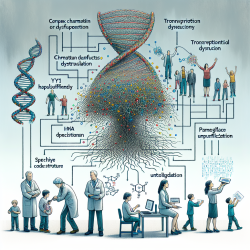Introduction
Recent advancements in genetic research have unveiled significant insights into the molecular underpinnings of intellectual disabilities. One such groundbreaking study, "YY1 Haploinsufficiency Causes an Intellectual Disability Syndrome Featuring Transcriptional and Chromatin Dysfunction," highlights the critical role of the YY1 gene in neurodevelopment. This blog aims to translate these research findings into actionable strategies for speech-language pathologists (SLPs) working with children exhibiting intellectual disabilities.
Understanding YY1 Haploinsufficiency
The YY1 gene encodes a zinc-finger transcription factor involved in both activating and repressing gene expression. The study identified 23 individuals with de novo mutations or deletions in YY1, leading to a syndrome characterized by cognitive impairment, behavioral alterations, and various congenital malformations. The research demonstrated that these mutations result in a global loss of YY1 binding, particularly affecting enhancer regulation and leading to widespread transcriptional dysregulation.
Implications for Speech-Language Pathology
SLPs can leverage these findings to enhance their therapeutic approaches. Here are several key takeaways:
- Early Identification and Intervention: Given the association of YY1 mutations with intellectual disabilities and speech delays, early genetic screening for YY1 mutations in children with unexplained developmental delays can facilitate timely intervention.
- Targeted Therapy: Understanding that YY1 haploinsufficiency affects enhancer regulation and transcriptional activity, SLPs can tailor their interventions to address specific language and cognitive deficits. For instance, therapies focusing on enhancing executive function and working memory may be particularly beneficial.
- Interdisciplinary Collaboration: Collaboration with geneticists and other healthcare professionals can provide a comprehensive understanding of each child's unique genetic profile, enabling more personalized and effective treatment plans.
Encouraging Further Research
The findings from the YY1 study underscore the importance of continued research in the field of genetic contributions to intellectual disabilities. SLPs are encouraged to stay abreast of the latest research and consider participating in or supporting studies that explore the genetic basis of speech and language disorders. By integrating research into practice, SLPs can contribute to the development of more effective, evidence-based interventions.
Conclusion
The study on YY1 haploinsufficiency provides valuable insights into the genetic factors contributing to intellectual disabilities and their impact on transcriptional and chromatin regulation. By incorporating these findings into their practice, SLPs can enhance their therapeutic strategies, leading to better outcomes for children with intellectual disabilities.
To read the original research paper, please follow this link: YY1 Haploinsufficiency Causes an Intellectual Disability Syndrome Featuring Transcriptional and Chromatin Dysfunction.










